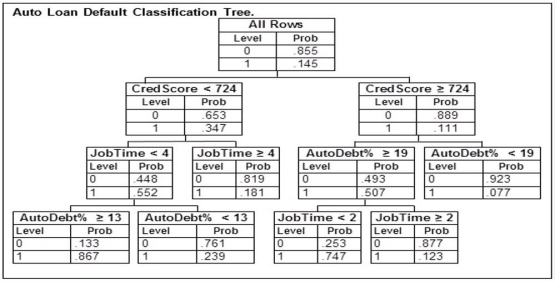Multiple Choice
An automobile finance company analyzed a sample of recent automobile loans to try to determine key factors in identifying borrowers who would be likely to default on their auto loan. The response variable Default equals 1 if the borrower defaulted during the term of the loan and 0 otherwise. The predictor variable AutoDebt% was the ratio (expressed as a percent) of the required loan payments to the borrower's take-home income at the time of purchase. JobTime was the number of years the borrower had worked at their current job at the time of purchase. CredScore was the borrower's credit score at the time of purchase. Below is part of the classification tree the finance company derived from the data collected in the study. Assume they classify those with a default probability estimate of at least .5 as Defaulters.  Based on this classification tree, a member of the study sample who had a credit score of 774, just started their current job, took out a loan with payments equaling 19% of their income, and did not default would be
Based on this classification tree, a member of the study sample who had a credit score of 774, just started their current job, took out a loan with payments equaling 19% of their income, and did not default would be
A) inaccurately classified as a Defaulter.
B) inaccurately classified as a non-Defaulter.
C) accurately classified as a Defaulter.
D) accurately classified as a non-Defaulter.
Correct Answer:

Verified
Correct Answer:
Verified
Q78: An automobile finance company analyzed a sample
Q79: A cable television company has randomly selected
Q80: Suppose that a bank wishes to predict
Q81: An automobile finance company analyzed a sample
Q82: A cable television company has randomly selected
Q84: An automobile finance company analyzed a sample
Q85: An automobile finance company analyzed a sample
Q86: The confusion matrix shows the number of
Q87: To predict a qualitative, or categorical, response
Q88: A regression tree is used for predicting